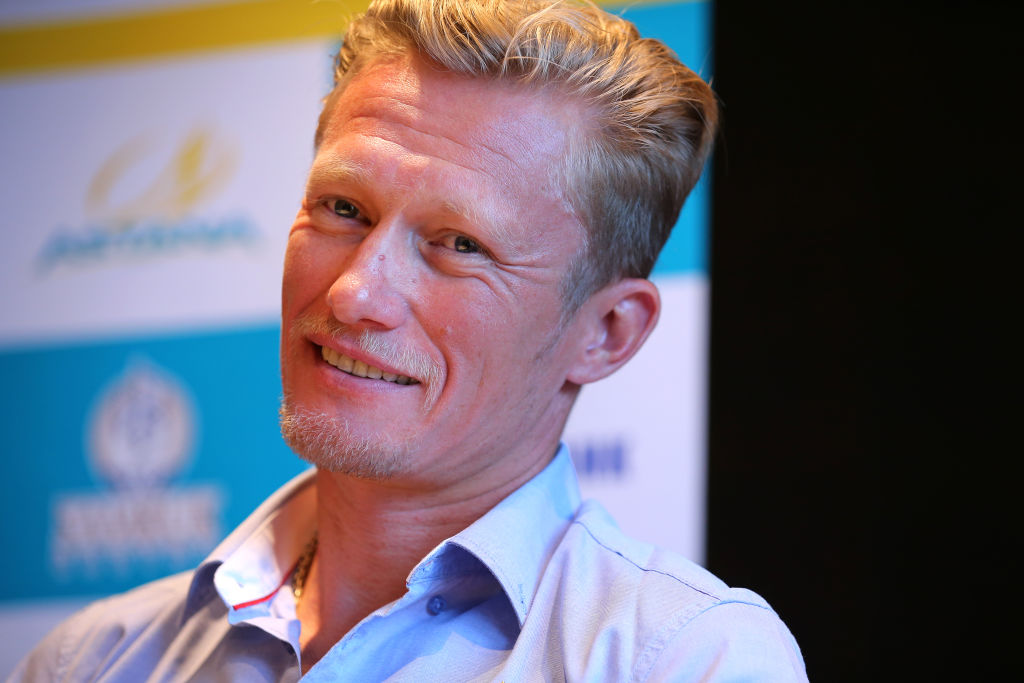Who is Alexander Vinokourov?
All you need to know about the longstanding Astana Qazaqstan manager and former rider who was no stranger to controversy

It's perhaps logical that Alexander Vinokourov is currently best-known as the team manager of Astana Qazaqstan, given he has now held that role, barring a brief intermission in 2021, for over a decade.
But in his time as a pro, the 49-year-old Kazakh hit the headlines himself for good reasons, as his country’s first ever Grand Tour winner, Monument champion, and Olympic gold medallist, but also because of a positive test for blood doping in 2007.
Born in the former USSR, after being educated in a sports school in the Kazakh capital, Almaty, Vinokourov’s move to France as an amateur represented a pivotal moment in his career. Based in Saint Etienne, his success brought him to the attention of Vincent Lavenu, the longstanding manager of the Casino team, later to become better known when the squad was rebranded as AG2R.
Vinokourov flourished fast and winning the Critérium du Dauphiné in his second year as a pro in 1999 - as chance would have it, ahead of another future WorldTour team manager, Jonathan Vaughters - brought him to the attention of the high-flying Telekom squad.
Vinokourov: Cavendish continuing is great news for all cycling, not just Astana Qazaqstan
Alexander Vinokourov - Staying power, Mark Cavendish and finishing careers the right way
Back to the Future: Nibali and López lead Astana's 2022 reboot
Astana renamed as Astana Qazaqstan Team following Premier Tech departure
Signed by the top German outfit in 2000, he quickly rewarded them with a breakaway stage win at that year's Vuelta a España and a silver medal in the Sydney Olympic Games, sandwiched between German teammates Jan Ullrich, who scored gold, and Andreas Klöden, bronze.
His most notable season with the top German squad, 2003, first stood out thanks to a second overall victory in Paris-Nice, claimed in tragic circumstances after the death of close friend and fellow Kazakh rider Andre Kivilev during the race. But Telekom, then rebranded as T-Mobile, offered Vinokourov opportunities to shine in the Tour de France as well, and he took them with both hands.
2003 also saw 'Vino' claim his country’s first-ever podium in cycling's biggest Grand Tour as well as a dramatic stage win at Gap. Then in 2005, having claimed his first of two editions of Liège-Bastogne-Liège by outsprinting fellow breakaway rider Jens Voigt, he rounded off his time at T-Mobile with an epic Tour de France stage victory on the Champs Elysées, ripping up the usual script of bunch sprint finishes on Paris’ most famous boulevard.
The latest race content, interviews, features, reviews and expert buying guides, direct to your inbox!
However, the darker side of Vinokourov’s success story was soon to be revealed, with the first stormclouds gathering when Liberty Seguros, the team he signed for after T-Mobile, was heavily embroiled in the massive anti-doping investigation, Operación Puerto, in Spain.
Despite not being directly implicated or named, the arrest of Liberty Seguros team manager Manolo Saiz and subsequent exclusion of the Spanish squad from the 2006 Tour de France prior to its Grand Départ in Strasbourg left Vinokourov out of the race and the team sponsor-less.
It was only when Astana, a conglomerate of Kazakh businesses named after the country’s new capital, stepped in to resolve the financial crisis that the team was definitively saved. Later that season, Vinokourov beat Alejandro Valverde to win his first and only Grand Tour, the Vuelta a España, winning three stages along the way.
Matters grew even more complicated on an individual level for Vinokourov in 2007 when he tested positive for blood doping during the Tour de France, just when he was fighting back from a series of crashes with two stage wins.
Banned for two years, on his return in 2009, again racing for Astana, he then claimed another edition of Liège-Bastogne-Liège prior to closing out his career with a gold medal in London’s Olympic Games in 2012.
Since retirement, Vinokourov has had a broadly successful career as team manager, with the undoubted highlight to date the victory in the 2014 Tour de France for Vincenzo Nibali.
After a few leaner years, in 2023 Vinokourov managed to pull off the signing of Mark Cavendish, widely considered to be the best sprinter of his generation and on a final quest for a record-breaking 35th stage win in the Tour de France.
Cavendish's victory on the last stage of the 2023 Giro d'Italia gave Astana their first WorldTour win of the season and considerably boosted the Briton's morale prior to July. Hopes of repeating that triumph in the Tour de France itself rose even higher with a second place on a bunch sprint into Bordeaux, only for Cavendish then to crash out of the race less than 24 hours later, breaking his collarbone.
It is testament to Vinokourov's talent as a manager, though, that following his crash and recovery, Cavendish agreed to delay his retirement by a year to 2024 and stay with the Kazakh team for another final attempt at winning a 35th Tour stage. And should the Briton succeed in his quest, Vinokourov's key role in the closing chapter of Cavendish's career will surely ensure the Kazakh and Astana Qazaqstan are back in the limelight as well.
Alasdair Fotheringham has been reporting on cycling since 1991. He has covered every Tour de France since 1992 bar one, as well as numerous other bike races of all shapes and sizes, ranging from the Olympic Games in 2008 to the now sadly defunct Subida a Urkiola hill climb in Spain. As well as working for Cyclingnews, he has also written for The Independent, The Guardian, ProCycling, The Express and Reuters.
